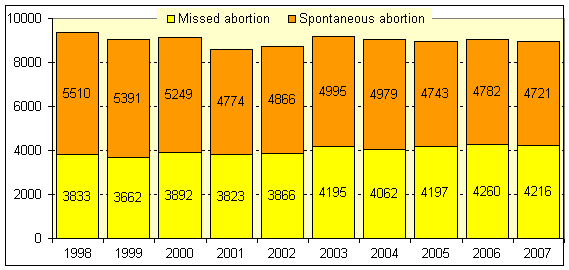
First trimester miscarriages in Denmark 1998-2007 (updated April 5, 2008)
Responsible: Christina H. Vestergaard and Řjvind Lidegaard
1.0 Miscarriages in Denmark, 1998-2007. N=90,016

Same in per cent
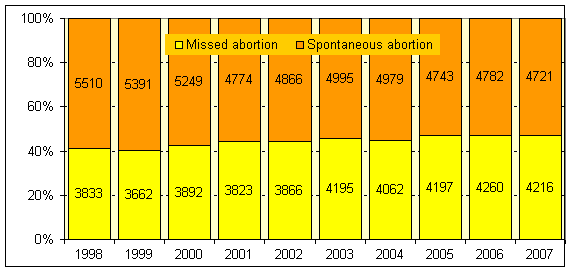
Comments: The total number of
first trimester miscarriages have been fairly constant through the last
ten years. The proportion of missed abortion has increased from 41% in 1998 to
47% in 2007.
1.1 First trimester miscarriages at different departments in 2007 (N=8,937)
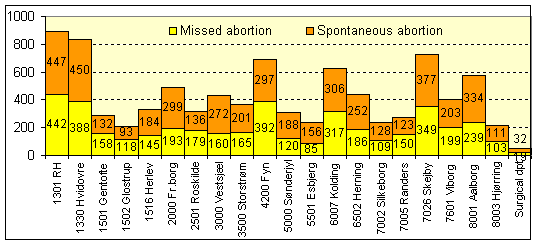
Same in per cent
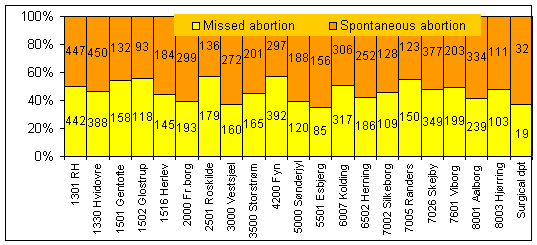
Comments: The proportion of
missed abortion among women with miscarriages ranged in 2007
from 35% to 60% at different departments.
1.3 Spontaneous abortions at
different departments in 2007
Incomplete:
1,507 (32%). Complete: n= 3,214 (68%)
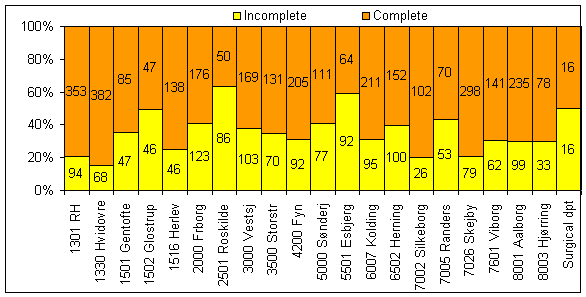
Comments: Some departments
have a high majority of incomplete spontaneous abortions while others have a
clear majority of complets spontaneous abortions. These proportions are
relatively stable from year to year at a
certain department. These differences suggest a different coding practice at
different departments.
1.4
Proportion (%) of women with spontaneous abortion surgically evacuated
at different
departments in 2007.
Incomplete: 1,507.
Complete: n= 3,214. Evacuated: 598 (13%)
Per cent indicated above each
column, absolute number of evacuations in italic inside each column
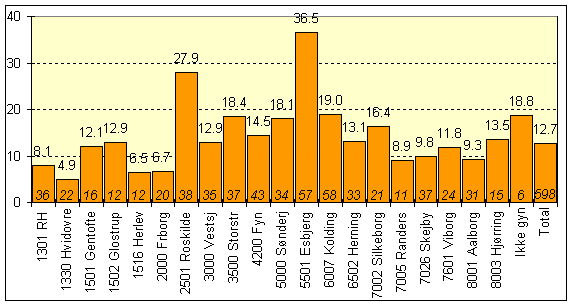
Comments: As compared with
the overall average of 13%, some departments have three times the
frequency of evacuations, while other departments have an evacuation rate of
less than one half of the average.
Of the 598 evacuated women, 530 (89%) had an incomplete abortion coded, 11% a compete abortion code.
10 (1.7%) were mis-coded with a KLCA code instead of the correct KMBA
code.
With a standard of less than 20% evacuated women, 18 (77%) out of 20 departments
fulfill this standard.
The rate ratio
between highest (36.5% in Esbjerg) and lowest (4.9% in Hvidovre) evacuation
rate has decreased from 8.3 in 2006 to 7.5 in 2007. It is the same departments,
which have a high
percentage of incomplete abortions as have a high rate of evacuations.
1.5 Association between the
percentage of incomplete abortions (x-axis) and
and the evacuation rate (y-axis).
Figures from 2007
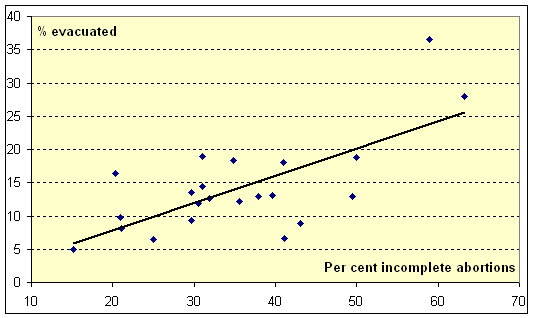
Comments: For each 10% the
proportion of incomplete abortions increase, the evacuation rate
increases with 5%, according to the linear regression line.
1.6 Evacuation in 1st
trimester spontaneous abortion 1998-2007. N=50,010, n=9,763
Comments: The proportion of
women undergoing evacuation fell from one third in 1998 to 13% in 2004,
and has been stable since then.
1.7 Evacuation rate in women with missed abortion in Denmark 1998-2007.
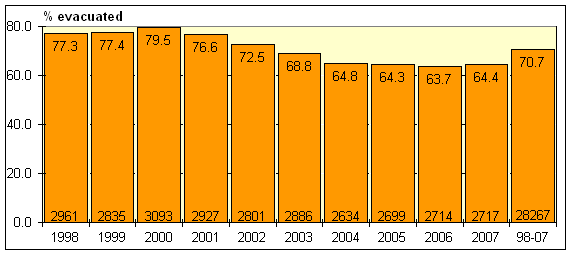
Comments: The proportion of women with missed abortion undergoing
surgical evacuation has been
fairly stable on 64% since 2004.
1.8 Surgical treatment of
missed abortion at different departments in 2007
Per cent evacuated
indicated in top of each column, absolute number of evacuated
indicated in italics in bottom of
each column.
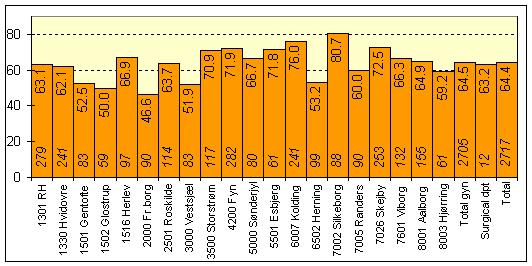
Comments: The proportion
evacuated ranged from 47% (Frederiksborg) to 81% (Silkeborg).
1.9 Medical treatment (%) of
women with missed 1. trimester abortion in
Denmark 2000-2007. N = 32,511. n = 2,014.
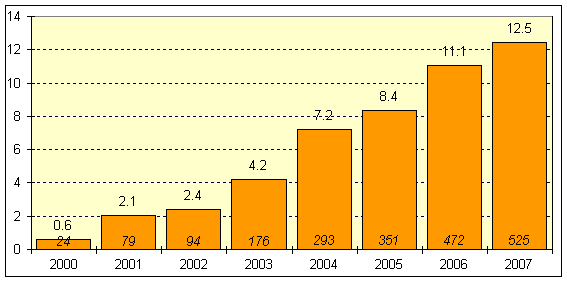
Comments: We have seen a
steady increase in medical treatment codes (BKHD50/52). However,
¨more than 13% of the 35% women with missed aborition without a surgical code
recorded have
received medical treatment. So we expect a further increase in the medical
treatment group the
next years.
1.10 Medical treatment of women
with missed abortion at different departments
in 2007. Per cent
medically treated in top of each column, absolute number of treated
indicated in italics in bottom of
each column. N = 4,216, n = 525
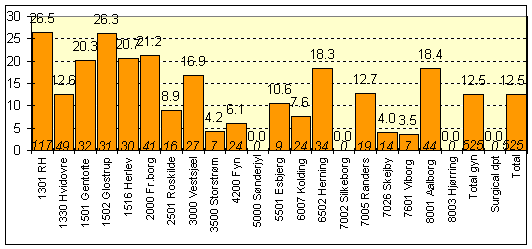
Comments: On average 12.5% of
women with missed abortion are coded with a medical treatment
code (BKHD50/52). 64.4% are coded with an evacuation code, leaving 23% without a
treatment
code. The majority of these women probably have been treated medically.
1.11 The proportion of women with missed abortion
being coded with either
a surgical code or a medical
treatment code at different departments 2007
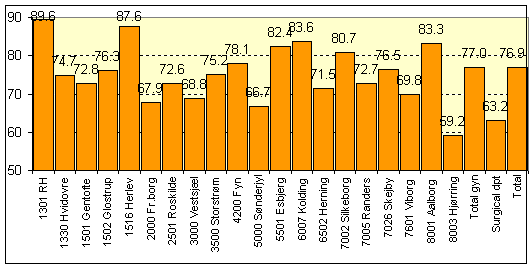
Comments: The proportion
without a surgical or medical treatment code ranged from 10% to 41%
at different departments. There is thus room for an improvement of the coding
quality at the majority
of departments.
1.12 Proportion of
evacuated women with missed abortion after medical treatment
at different departments
in 2007. N = 525, n = 133.
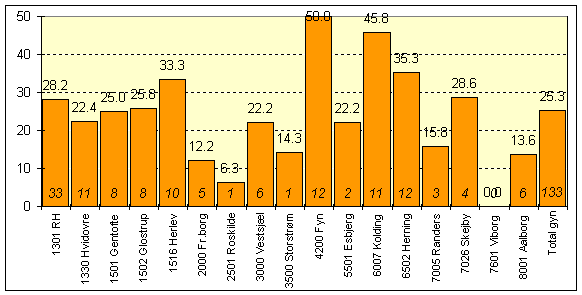
Comments: Due to small
numbers at each department, much of the variation is due to statistical
chance. Note, that in total 25% of women treated medically for missed abortion
ultimately end up
with an evacuation. Therefore a high primary evacuation rate is acceptable for
missed abortion.